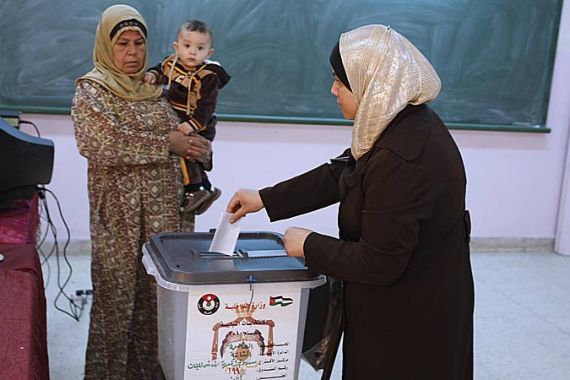Violence hits Jordanian election
One person is killed and several others injured as fighting between rival tribal groups breaks out amid vote.

 |
| Senior election officials announced that voter turnout had reached 53 per cent across Jordan [AFP] |
Violence has broken out amid parliamentary elections in Jordan, leaving one person dead and up to six others injured.
An armed fight erupted on Tuesday between supporters of two rival candidates in Imrea, a small town near the southwestern city of Kerak, killing a 25-year-old man.
Nisreen el-Shamayleh, Al Jazeera’s correspondent in Amman, the capital, said a second incident in the city saw polling stations vandalised, candidates attacked and some cars damaged.
El-Shamayleh said riot police were deployed in Imrea to disperse the tribal groups with tear gas.
“These incidents are not unusual. Usually tribesmen in Jordan are armed on election day, some of them have even used methods of intimidation trying to prevent people from voting for certain tribes in order to control the vote,” she said.
“These are very local fights but it’s definitely violence that mars the election process.”
Polls have closed at 1700 GMT, and Saad Shehab, a senior election official, announced that turnout had reached 53 percent.
“Voting will not be extended and counting started immediately after the polls closed,” he said.
The official results are expected to be announced by Nayef Qadi, the Interior Minister, on Wednesday.
Election boycotts
Tuesday’s elections have been boycotted by the Muslim Brotherhood, the country’s main opposition group, and liberal groups protesting against an election law they say harms democracy.
“The election law has sidelined all the vocal critics of the government,” Jamil Abu-Bakr, a spokesman for the Muslim Brotherhood, the Islamic Action Front’s umbrella group, said.
“The election is far from being fair and honest, considering reports of fraud we’re hearing.”
|
Nisreen el-Shamayleh reports on the boycott against the general elections by Islamic groups in Jordan |
The electoral system is said to under-represent large cities that are Islamic in favour of sparsely populated areas dominated by conservative tribes who defer to the monarchy and traditional systems of law.
Government officials promised the elections would be free, fair and open to diplomatic and international observers, and warned the opposition they were in no position to criticise a process they pulled out of months ago.
“Those who don’t vote will not be participating with others in shaping their country’s future,” Samir al-Rifai, the prime minister, said on state television.
The government, appointed by King Abdullah last year, adopted an unpopular law that critics say ensure a pliant assembly.
Many voters expressed scepticism that the new legislature would be able to create needed jobs or alleviate growing poverty despite colourful banners and campaign posters promising improvements.
“Putting food on the table is our national priority,” read one.
Mohammed Dallal, a 40-year-old clothing shop clerk from Amman, said he wasn’t voting because he was “fed up with lawmakers lying to us. They promise us things, but when they get to parliament, they forget.”
Financial downturn
Jordan was among the hardest hit of the Arab nations during the global economic crisis in 2008 and 2009.
The country relies heavily on foreign investments and remittances from workers abroad and foreign aid, all of which were affected during the financial crisis.
The US is Jordan’s largest aid donor, spending $4bn in the last decade to keep the economy of its key Arab ally, which borders Iraq, afloat.
“Jordanians are interested in the elections and politics, but the main concern, especially among poor families, is to feed their hungry children,” Hani Horani, a local economist, said.
Horani pointing to an unemployment rate estimated at 13.3 per cent, poverty at 16 per cent, inflation at 4.5 per cent and a growth rate projected at 2 per cent this year.
In all, 763 candidates, including 134 women, were vying for votes from an eligible electorate of 2.4m people over the age of 18.
The elected lower house of parliament, or Chamber of Deputies, has 120 seats, including 12 allocated for Christians and other minorities. Twelve others are set aside for women.
Anti-government candidates charged that Jordan is not showing enough opposition to Israeli policies amid fears that if Israeli-Palestinian peace talks fail, Israel could try to expel the 2.5m Palestinians from the West Bank into Jordan.
While only a tiny fraction of Israelis support such a scenario, the fear is palpable in Jordan, where Palestinians number about half the country’s population.